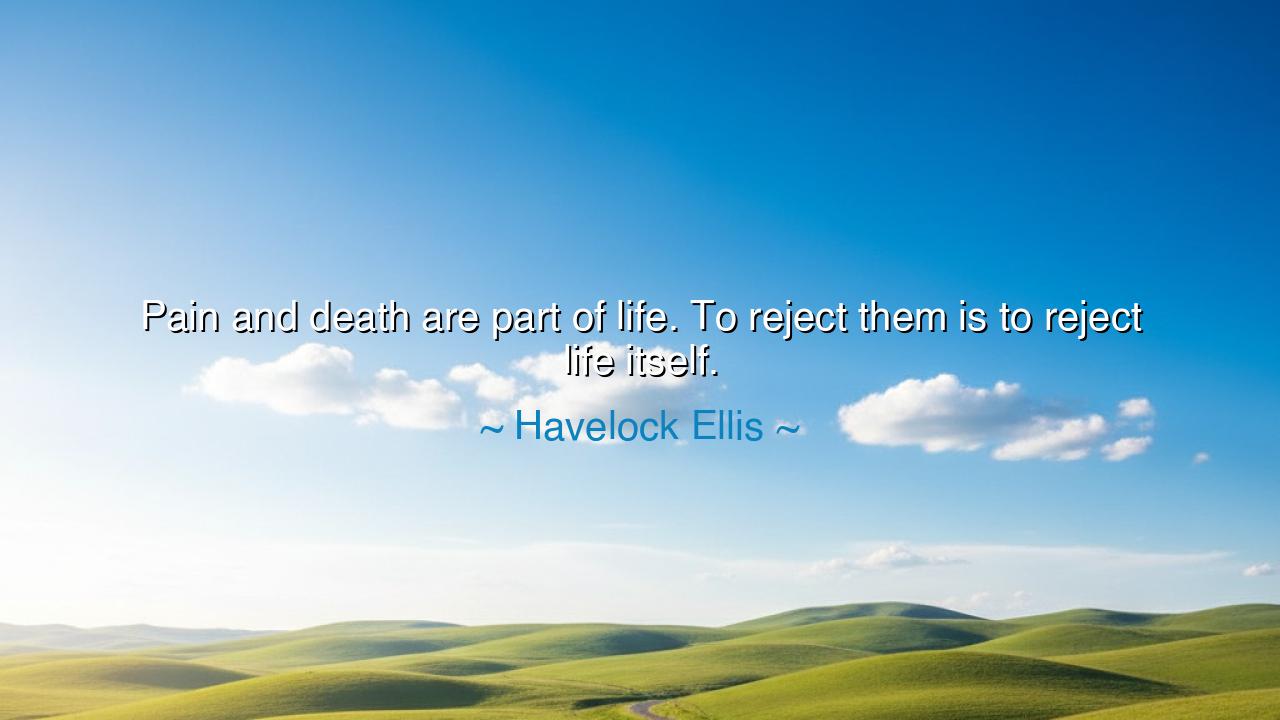
Pain and death are part of life. To reject them is to reject life






“Pain and death are part of life. To reject them is to reject life itself.” Thus spoke Havelock Ellis, the English philosopher, physician, and seeker of human truth. In these few words lies a wisdom as old as the dawn and as necessary as breath: that suffering and mortality are not enemies to be defeated, but companions on the road of existence. For life is a tapestry woven not only of joy and love, but also of loss, struggle, and ending. To deny this truth—to flee from pain or to hide from death—is to turn away from the fullness of what it means to be alive. Ellis, a man who studied both the body and the soul, reminds us that one cannot taste the sweetness of living without also tasting its bitterness.
Havelock Ellis, born in 1859, lived during a time when science and philosophy were struggling to reconcile human suffering with reason. As a physician, he saw pain firsthand—not as punishment, but as part of the design of being. He understood that to live is to experience the full spectrum of existence, from laughter to grief, from birth to death. His words echo the spirit of the Stoics and the sages, who taught that the wise man does not seek to escape pain but to embrace it as the teacher of endurance, humility, and compassion. Ellis’s message is clear: in trying to erase suffering, we risk erasing the very essence of life itself.
The ancients knew this truth well. The Stoic philosopher Epictetus, once a slave who suffered both poverty and cruelty, said, “Remember that you are an actor in a play, and that the play may be long or short, happy or tragic—it is not for you to choose, but to perform your part well.” In this, we see Ellis’s sentiment mirrored: pain and death are not curses, but roles assigned by the natural order. To reject them is to rebel against the script of existence, to deny the artistry of the cosmos. Just as the night gives meaning to the day, so does pain give depth to joy, and death give urgency to life. Without them, life would be a hollow shadow—endless but empty.
Consider the story of Helen Keller, born blind and deaf, who could easily have succumbed to despair. Yet from her silence and darkness arose a spirit radiant with understanding. She once said, “Character cannot be developed in ease and quiet. Only through experience of trial and suffering can the soul be strengthened.” Her life stands as a living embodiment of Ellis’s wisdom: she accepted pain as part of life, and through it, discovered a beauty deeper than sight, a harmony greater than sound. To her, suffering was not a curse but a pathway to awakening, a crucible through which the soul finds its strength.
To reject pain, Ellis warns, is to seek illusion—to live a shallow life numbed by comfort, distracted by pleasure, and shielded from truth. In our age, men flee from suffering as though it were evil, inventing endless diversions to dull their awareness of mortality. Yet the avoidance of pain does not create peace; it creates emptiness. Those who fear death fear also the passage of time, and so they live as prisoners of their own anxiety. The one who accepts pain and death as part of the great design, however, finds freedom. For when one no longer resists the inevitable, life itself becomes a gift—each sunrise a victory, each breath a miracle.
Ellis’s insight also reveals a sacred balance. He does not glorify pain, nor seek it for its own sake. Rather, he calls us to accept it as a teacher. Pain reminds us of our vulnerability and our interconnectedness—it softens the heart, teaches empathy, and strips away pride. Death, too, is not annihilation, but transformation—the closing of one chapter so that others may begin. To deny these is to live in denial of nature itself, for all creation is born, suffers, and passes away. The flower blooms only to wither, yet in its brief life it fulfills its purpose and scatters seeds for the next season.
So, my child, take this teaching into your heart: do not flee from pain or fear death, for they are as sacred as joy and love. When suffering comes, meet it not with bitterness but with understanding; when loss arrives, let it deepen your gratitude for what remains. Live fully, knowing that pain will visit you and death will claim you, but neither can defeat the soul that accepts them as part of the divine rhythm. For to live wisely is not to escape suffering, but to be awake within it—to see in every sorrow a hidden light, and in every ending the promise of renewal. Thus, in embracing pain and death, we do not diminish life—we complete it.






AAdministratorAdministrator
Welcome, honored guests. Please leave a comment, we will respond soon